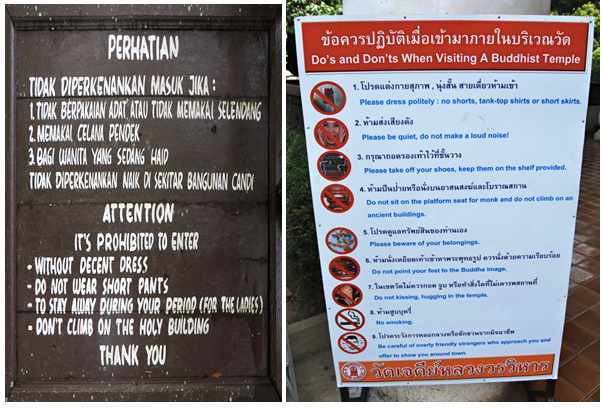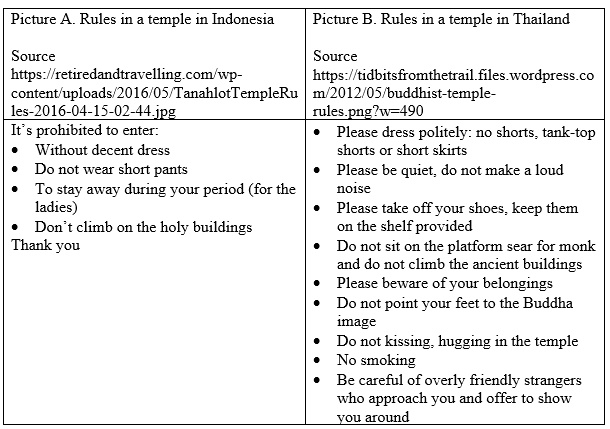- Home
- Lesson Ideas
- Lesson Ideas: Discussing Religious Values in English Classrooms, In an Intercultural Way
Lesson Ideas: Discussing Religious Values in English Classrooms, In an Intercultural Way
Fenty Lidya Siregar has been a teacher for over 15 years. She now teaches at Maranatha Christian University, Indonesia. She obtained her Ph.D. in Applied Linguistics from Victoria University of Wellington. She is interested in intercultural language teaching, teacher beliefs, motivation, and language policy.
Introduction
Religion is a sensitive issue in Indonesia as well as in English language teaching (ELT) generally. It is one of the seven most observed taboo topics and has been widely avoided in English language teaching (Gray, 2002). However, both religion and ELT are very important aspects of life in Indonesia. In other words, addressing the issues related to religion in English classroom is important.
When preparing intercultural English lesson that can facilitate learners to improve their intercultural competence, Liddicoat and Scarino (2013) suggest teachers to move beyond textbooks and select resources that can guide learners to explore a broad range of cultural themes such as gender, social class, ethnicity, region, religion, and political affiliation. In other words, while religion is often taboo for textbook publishers, it is in fact invaluable topic for learning values embedded in various culture. Thus, the question is how English language teachers can prepare their students to obtain intercultural competence and get involved in any discussion on different values related to different religions without offending other people.
When discussing the taboo topics, it is essential to discuss whether certain types of taboo/values are easier to accept or tolerate than others, where this taboos/values might come from, and how they influence the constructions of our identities. Jokikoko (2009) claims that “cultural relativism or accepting anything and everything” is not the goal of intercultural education; however, teachers should encourage and challenge students to explore issues from, for example, different cultural, societal, and religious perspectives.
The following example presents ideas how teacher can include discussion on religion and different values from Indonesia and other countries in one lesson.
Lesson outline
Title: Holy and touristic places and rules
Aims: To enable students:
- To express opinions about the faith and rules
- To explore and discuss rules in touristic as well as holy places for cultural insights
- To improve their ethnographic skills
- To explore cultural practices of a subculture in order to promote reflection upon socially constructed identities and values in our and other communities
Target groups: Young adults and adults / General English contexts.
Level: Pre-Intermediate to upper-intermediate
Time- 30- 40 Minutes
Procedure
- Show the pictures of rules from two different temples: a temple in Indonesia and a temple in Thailand.
- Explain that some rules might lead to a controversial issue and should be discussed in an open and positive manner. No hate speech or prejudice will be tolerated.
- Pair off students and ask them to discuss the following:
- Have you seen similar rules in your area?
- What are the similarities and differences between the rules in the pictures and the rules in your area?
- What rules are unfamiliar to you? Why do you think they have the rules like that in the temple(s)?
- What will you do if you are asked to follow the rules?
- Which rules are easier to follow?


- Have the pairs to compare their answers. Start a class discussion to discuss students’ answers.
- Tell the students that they will bring some international students to a religious place in their city and they need to prepare a trip rule including explaining the rules of the destination to the international students
- Ask the students to reflect on values embedded in the rules that they just create and why they have embraced the values and wish other people to be aware of and respect the values
Variation
To make the lesson more challenging for the upper-intermediate level students, teacher can ask them to read an article entitled “Menstrual taboos in Bali; exploring the deep and wild within” by Jodie Danaan (2015) and write a reflective essay on the issue.
Reflection
Having used the lesson plan for several times in Indonesia and once in Vietnam, I realised that discussing religious values and rules in EFL classroom is beneficial to make students aware of her own culture and increase their empathy toward other as they explore the diversity of culture and put themselves in others’ shoe. Student will also learn how to notice and observe the relationship of culture and language as it appears in the construct of rule excepts. Moreover, reflecting on the context and my experience of using the lesson plan in Vietnam, I become fully aware that teachers need to search information about the diversity in the classroom in advance to minimize the potential problems as well as maximizing the result of the lesson. For example, If we know the diversity of students’ belief or religions, it can help us decide what example of rules we should bring and what questions and examples we should prepare related to the rules.
References
Danaan, J. (2015, January 26). Menstrual taboos in Bali: Exploring the deep and wild within. Retrieved from https://medium.com/@Oakwillowcircle/menstrual-taboos-in-bali-exploring-the-deep-and-wild-within-56b7a4088a4.
Gray, J. (2002). The global coursebook in English language teaching. In D. Block & D. Cameron (Eds.), Globalization and language teaching (pp. 151–167). London: Routledge.
Jokikokko, K. (2009). The role of significant others in the intercultural learning of teachers. Journal of Research in International Education, 8(2), 142–163. https://doi.org/10.1177/1475240909105202
Liddicoat, A. J., & Scarino, A. (2013). Intercultural language teaching and learning. Retrieved from http://onlinelibrary.wiley.com.helicon.vuw.ac.nz/book/10.1002/9781118482070
Please check the British Life, Language and Culture course at Pilgrims website.
Lesson Ideas: Discussing Religious Values in English Classrooms, In an Intercultural Way
Fenty Lidya Siregar, IndonesiaTo-Too-Two, Price-Prize, See-Sea
Johanna B. S. Pantow, IndonesiaBilingual Short Story for Translation Class
Junaedi Setiyono, Indonesia“Where is Komodo?”: Student-tailored E-books for Indonesian EFL Learners
Ju Seong Lee, Hong Kong SAR, China;Nicole Lam, Hong Kong SAR, ChinaA Private Reading Lesson: A Story with Cia
Sandi Ferdiansyah, IndonesiaImpressive First Class Meeting: Jigsaw Technique Oriented
Siti Mina Tamah, Indonesia“Switching” to Critical Reading: Reading within the Four Resources Framework
Endang Setyaningsih, IndonesiaTeaching Students on How to Summarize Journal Articles
Dyah Sunggingwati, Indonesia